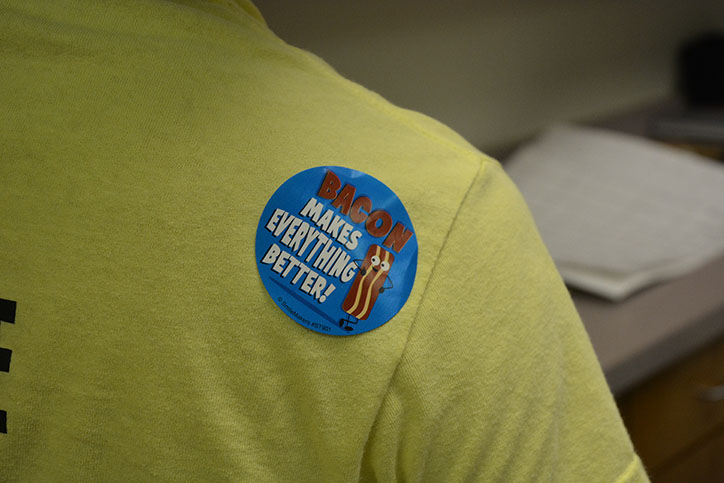Bacon joins cigarettes on list of cancer causes
Bacon stickers were handed out at lunch on a day that the entree was a bacon cheeseburger. They show the love that students share for bacon all throughout the school.
December 1, 2015
According to a press release Oct. 26 released by the World Health Organization, if one eats (at least) one 50 gram portion of processed meat a day, one’s risk of colorectal cancer increases by 18 percent. According to BBC Health 50 grams is less than two slices of bacon. However, the risk of colorectal cancer is increased by 18 percent only if this amount is eaten every day.
Bacon is a common product from Iowa farms, with pigs producing 7.1 billion slices of bacon according to the Iowa Farm Bureau. Senior Kyle Clancy is a fan of the meat and enjoys bacon as much as the next person.”When I think of the greasy crispy goodness, it makes my heart warm, just like the bacon I’m about to consume,” Clancy said.
However, there is a darker side to bacon: it can cause cancer.
This fact does not phase Clancy and his bacon eating habits. “I think cancer is definitely worth it,” Clancy said. “Frankly, everyone dies, and I’d rather die happy and eating bacon than die miserable and not eating bacon.”
The consumption of red meat has been placed in the carcinogenic group 2A, which means that it is probably carcinogenic to humans, according to Mercy clinical dietitian Jacque Schwartz. There is some evidence showing that it is carcinogenic (cancer causing), but not enough for researchers to be sure.
However, colorectal cancer is caused by other things too, not just processed and red meats. “Many dietary factors may be involved – portion sizes, cut of meats/fat content, whole grain consumption, fruit & vegetable consumption, not to mention other lifestyle habits,” Schwartz said.
On the other hand, processed meats are placed in group one, or considered definitely carcinogenic to humans. This means that there is substantial evidence that processed meats cause cancer. Other things in group one include tobacco, alcohol, asbestos and tanning beds.
Bacon is not as bad as tobacco. Just because processed meat is in the same category as cigarettes, does not mean they are equally as dangerous. “Someone who smokes is probably going to do it on a daily basis, whereas someone who eats red meat [is] not going to eat red meat for every meal or every 2 hours, like a person that would be addicted to tobacco,” health teacher Jackie Sapp said.
There are an estimated 34,000 cancer deaths a year that could be related to high red meat consumption, while there are an estimated 600,000 cancer deaths a year from alcohol and smoking (BBC Health).
Red meat is s red when raw and not pale in color when cooked, in contrast to white meat. It is natural and not changed at all. Processed meat, on the other hand, is any meat that has been changed to lengthen it’s shelf life or change the taste. The most common ways of doing this are smoking, curing, or adding salt and preservatives to the meat. Bacon is usually salted and smoked, making it fall into the processed meat category.
“You take a look at our other foods, and things that are high in sodium, and all our processed foods, not just meats, are loaded with junk and they’re not good for us,” Sapp said.
When asked what she believes people could change to prevent cancer, Schwartz said: “My reaction would be about adopting healthy lifestyle habits. We should be working to increase our activity levels and eating healthy,”






